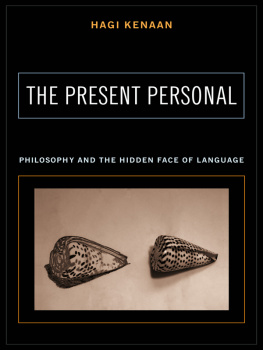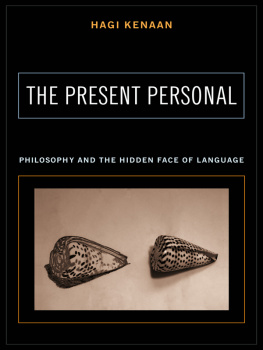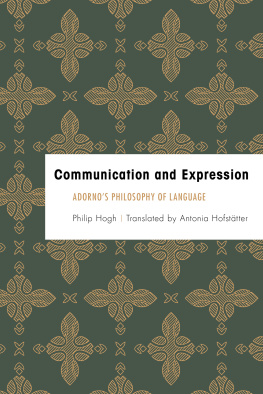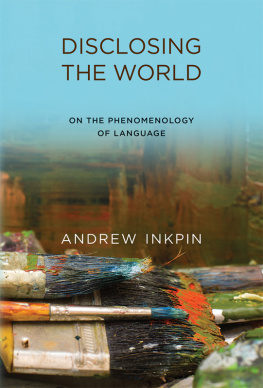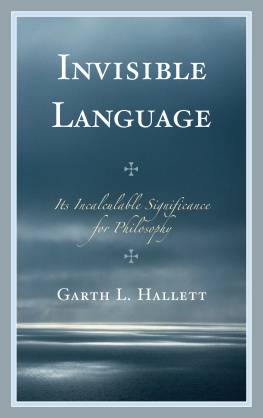The Present Personal
The Present Personal
PHILOSOPHY
AND THE
HIDDEN
FACE OF
LANGUAGE
HAGI KENAAN

COLUMBIA UNIVERSITY PRESS
NEW YORK

COLUMBIA UNIVERSITY PRESS NEW YORK
Publishers Since 1893
New York Chichester, West Sussex
cup.columbia.edu
Copyright 2005 Columbia University Press
All rights reserved
E-ISBN 978-0-231-50827-8
Library of Congress Cataloging-in-Publication Data
Kenaan, Hagi.
The present personal : philosophy and the hidden face of language / Hagi Kenaan.
p. cm.
Includes bibliographical references and index.
ISBN 0231133502 (alk. paper)
1. Language and languagesPhilosophy. I. Title
P107.K46 2004
302.2'24'01dc22 2004056036
A Columbia University Press E-book.
CUP would be pleased to hear about your reading experience with this e-book at .
To Vered Lev
the secret of a roses heart
my love and admiration
The Present Personal was written in Tel Aviv between 2001 and 2003. These opening years of the twenty-first century failed to fulfill any of the hopes raised by the advent of a new millennium. Living in Tel Aviv, in Israel, it has been impossible to alleviate or even pretend to alleviate the darkness of this period, one during which violence, hatred, intense human suffering together with the growing indifference toward the suffering of others have become the form of daily life.
This period has not been a very conducive one for the writing of a philosophy book. Indeed, The Present Personal was composed inand despitean atmosphere that ultimately renders any form of reflection not specifically connected to the political context irrelevant, a situation in which the need for radical and even subversive action on the part of individuals is so pressing that it threatens to leave the engagement with humanistic work bereft of any genuine value.
The Present Personal is a philosophical attempt to think the depth of the possibility of listening to the other person. This ethical possibility belongs to the heart of our human interaction, and yet it typically remains so inconspicuous and undemanding that philosophy can ignore it altogether, as if it did not exist. This possibility is referred to in this volume as the personal although other termssuch as the singular or the idiosyncraticare also useful. In writing this book I have been motivated by the belief that by listening to the personal we could make our world a better place to live in.
I shall remember the writing of this book as an essentially solitary experience. This is probably not news. At the same time, I was also most fortunate to enjoy the constant support and help of friends, family, teachers, colleagues, and students.
Karsten Harries, who was my adviser at Yale ten years ago, has encouraged me ever since to carry on the difficult search for a style of thinking that I could call my own. Since generosity comes so naturally to Harries, Im not sure he knows just how important this encouragement has been for me over the years. Ran Sigad was my most influential teacher during my undergraduate studies at Tel-Aviv University. In addition to his lasting friendship, I wish to thank him for his careful reading of this manuscript and for the way in which, sensing that I needed to let go of it, he decided very much against himself to spare me the pointed edge of his criticism.
My mother, Nurith Kenaan-Kedar, her husband Benjamin Z. Kedar, and my brother Jonathan Canaan have always been close, constant, and loving companions. My father, Gabriel Canaan, did not live to read this manuscript. I wonder if it would have appealed to him. I am not sure. However, before his death, before the book was underway, I did have a chance to read to him a few pages that now appear in . In recalling his response, I greatly miss him.
I am delighted to thank my ten-year-old daughter, Ilil, who is every bit as special as her name and definitely the most marvelous girl I know.
The support of my friends was invaluable to the writing of this book. It was so invaluable, in fact, that I can only hope I am more successful in expressing my gratitude to them in private. Nevertheless, I wish to acknowledge several significant discussions that were formative to my work. These include a long conversation with Ariel Meirav while wandering the city during the course of an afternoon that turned into evening, a late-night conversation with Yaron Senderowicz at a bar, a conversation with Eli Friedlander alongside a pond, another conversation sparked by Leora Bilsky saying I only now realize that this life is mine, a talk with Wayne Froman at a Chagall exhibition, and a conversation with Vered Lev Kenaan while sitting, next to each other, on a planeclouds around us. To her I dedicate this book.
There were other conversations that were significant at various stages and junctions in the writing of this book: dialogues with my friends Gabriela Basterra, Simon Critchley, Hanoch Dagan, Dan Daor, Ilit Ferber, Ron Katwan, Lior Levi, Noa Naaman-Zauderer, Joel Pearl, and Eli Stern. These friends read sections of, and sometimes all of, my manuscript while being themselves intensely engaged in projects of their own. I am grateful to them for their illuminating and helpful responses.
The philosophy department at Tel-Aviv University has provided me much more than just colleagial support. I would especially like to thank Shlomo Biderman and Zvi Tauber. I deeply thank Yehonatan Maor, Jessica Moss, Emily Wittman, and Michael Zakim, for their engaged and insightful suggestions for improving the manuscript. It is to Emily Wittmans imagination, in particular, that I owe the title of this book, The Present Personal. Special thanks are due to Wendy Lochner of Columbia University Press, whose enthusiastic response to and warm welcome of the book meant a lot to me. I also thank Susan Pensak for her sensitive editing of the final manuscript.
In making a beginning, this book needs to overcome a certain difficulty. Unlike many philosophical books that have the privilege of simply plunging into a given question or of naturally making a move on a map they take for granted, this study belongs to a family of philosophical texts whose subject matter is not yet charted by philosophical discourse and whose central questions need time in order to resonate as questions at all. The Present Personal: Philosophy and the Hidden Face of Language is concerned with a dimension of the experience of language that, for different reasons, cannot call attention to itself within the horizons of the investigation of language carried out by either Anglo-American or Continental philosophy. Somewhere in between Anglo-American and Continental perspectives on language, there is a hidden lacunaa blind spot that marks our inability to recognize the depth of the connection between our experience of language and our experience of persons.
How is the speaking individual present in language? How do you inhabit your language, or, in what way is it you who inhabits the language that you speak to me? In what sense are you there in the words you utter? What is the relation between your singularity as an individual and the general and public structure of the language you use?
The relationship between everyday language and the speaking subject is articulated in fundamentally different ways by Anglo-American philosophy of language and Continental thought. Yet, despite these differences, in both traditions the understanding of this relationship typically takes the form of a general presupposition all too readily taken for granted that, as such, levels the depth of the above questions and ultimately severs the crucial tie between our relation to language and our relation to others. Consequently, philosophy today is indifferent to the question of listening. Philosophy seems unable to illuminate for us the possibility, the event, the situation, of listening to the speech of the other person. And it cannot help us in the search for genuine forms of listening to each other. But is this something philosophy should be able to do?
Next page
